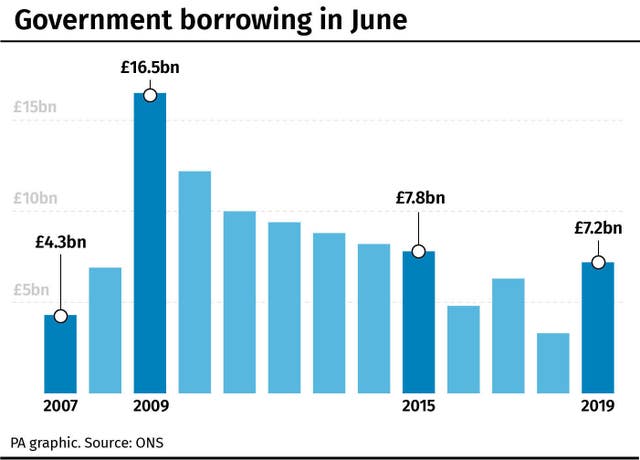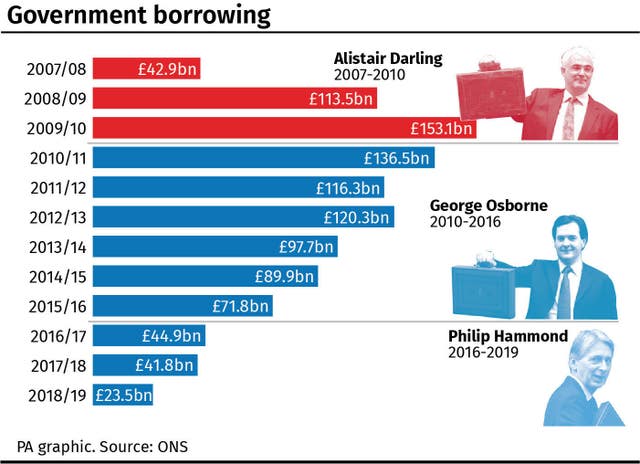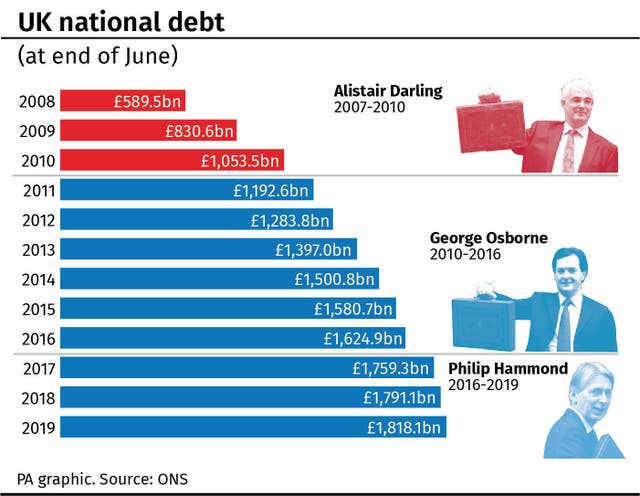
Britain’s budget deficit swelled by more than expected last month, after the Government borrowed more than £7 billion to help balance the books.
The Government posted the highest borrowing figure for June since 2015, according to the Office for National Statistics (ONS).
The public sector borrowed £7.2 billion in June – £3.8 billion more than June last year – as it spent more money than it received in taxes and other income.

Since the start of the financial year, the Government has borrowed £17.9 billion, representing a significant rise from £13.4 billion over the same period last year.
In June, central government spending increased by £4.3 billion, or 7.2%, to £64.8 billion.
Meanwhile, Government receipts increased by £800 million, or 1.5%, to £58.7 billion.
Receipts grew on the back increased income tax and national insurance income, which rose by £300 million and £500 million respectively compared to June 2018.
The amount received in VAT receipts increased by £100 billion compared to the same month last year, although this was offset by a £100 million fall in corporation tax income.
The fiscal watchdog, the Office of Budget Responsibility (OBR), said it expects £29.3 billion to be borrowed in total this year, but borrowing is currently ahead of forecasts.

Howard Archer, chief economic adviser at EY Item Club, said: “On the basis of April to June, borrowing is headed for £31.4 billion – but it is premature to draw any firm conclusions as monthly public finance data can be prone to significant revisions as well as being influenced by specific factors.
“Much will depend on whether the economy can shrug off its current weakness as well as on Brexit developments.
“It will also be influenced by any changes to fiscal policy by the new Prime Minister and Chancellor.”

The figures also revealed that public sector debt grew by £27 billion to £1.82 trillion at the end of June.
As a proportion of GDP, the debt shrank by 1.5 percentage points to 83.1%.
John McDonnell, Labour’s shadow chancellor, said: “With the Conservatives obsessed with no-deal Brexit and a race to the bottom on taxes, the outlook for our public services after years of austerity is grim.
“Instead of investing to grow they have passed on the deficit to hospitals and local councils, overseeing stagnating wages and productivity.”


Comments & Moderation
Readers’ comments: You are personally liable for the content of any comments you upload to this website, so please act responsibly. We do not pre-moderate or monitor readers’ comments appearing on our websites, but we do post-moderate in response to complaints we receive or otherwise when a potential problem comes to our attention. You can make a complaint by using the ‘report this post’ link . We may then apply our discretion under the user terms to amend or delete comments.
Post moderation is undertaken full-time 9am-6pm on weekdays, and on a part-time basis outwith those hours.
Read the rules hereLast Updated:
Report this comment Cancel